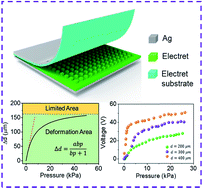Theoretical study and structural optimization of a flexible piezoelectret-based pressure sensor†
Abstract
Flexible pressure sensors have attracted increasing attention for wide application in wearable electronics and artificial intelligence. To enhance the pressure sensitivity of such sensors, a theoretical study based on modeling and experimental validation is required. Here, we theoretically demonstrated a method for optimizing the sensitivity of flexible piezoelectret-based pressure sensors (FPPS) by investigating the electric-mechanical behavior. A new model was established to estimate the compressibility and analyze the pressure sensitivity of the tunable FPPS. Experimental verification was carried out by fabrication of an FPPS based on a perfluoro (alkoxy alkane) (PFA) electret and tuning of the supporting structures. Based on tuning of the pressure sensitivity of the FPPS, a pressure sensor with a sensitivity of 15 V kPa−1 in the range of 0–2.5 kPa was demonstrated and successfully applied for energy harvesting and self-powered human biological signal detection.


 Please wait while we load your content...
Please wait while we load your content...